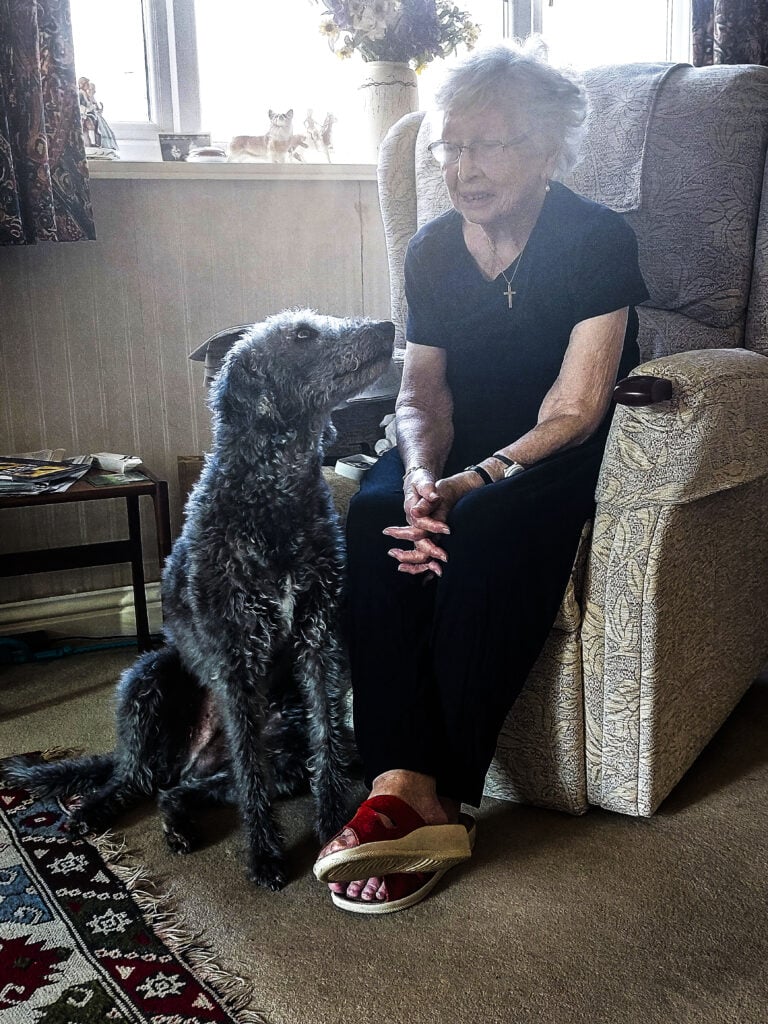Catherine's story
Catherine has been a carer for over 20 years, supporting people in their own homes, first with domiciliary work and most recently with Elder as a live-in carer.

For Catherine, working in one home at a time is a more relaxed work pattern that suits her age and lifestyle, while still allowing her to make a real difference to people’s lives. We talked to her about the benefits and challenges of live-in care, and why building a relationship is crucial to any successful placement.
I started my career as a domiciliary care worker, going from home to home to support people. It was a job that was available at the time – but most importantly, I have the heart to be a carer. It’s in my nature to care for other people.
Giving back to another human being from a different perspective than, say, working in a hospital, suited me – and I have been a carer for over 20 years now. I’ve worked in most settings, but I have always enjoyed supporting people in their own homes on a one-to-one basis the most.
In a nursing home you have about 30-40 residents to look after, and as such you don’t really have any meaningful relationship with them. I chose home care because of the relationships you can build. I give – and I get something valuable out of it too.
I started working in live-in care two years ago and I think it suits my age. I am 53, and it is a much more relaxed environment to work in than domiciliary care. I’m not running for the bus or having to go here and there every day now. This is a work pattern I can control; I decide how I work and how I do my duties.
For example, I can decide with a client what time we wake up and have breakfast. I like that because you cannot rush elderly people. It also suits me perfectly, because I am of an age where I also want to be a bit slower.
When I first started live-in care, I wanted to experience different clients, and I have had many experiences now, from people with spinal injury to those with mild and severe dementia. It has made me an even better carer.
Catherine
I also like the fact that work placements with Elder don’t have to be consecutive. I can do placements for three months and then go away for a month – which is also important to me because now I also have to look after my own parents and travel back to Africa to support them when I can.
My shortest placement so far has been five days, my longest was four weeks in a row for a couple. I was there to support the husband, but I also ended up caring for his wife in some ways.
You soon realise that this type of care is not just about being able to do the physical jobs. It’s about having a listening ear, but also in many cases the mental capacity to handle the pressure of someone who is constantly asking you what they already asked you two minutes ago.
Live-in care has many good points but there are also challenges. A percentage of my clients have had this arrangement organised by their families. So, as much as they are informed about it, they are sometimes not full participants in the decision to have a live-in carer – ultimately a stranger – in their own home.
They can take that frustration out on you, and you have to be laid back and not take things to heart. Instead, it’s vital to try hard to form a relationship with the client and convince them that you are there to do good.
I let them lead the way for me and ask them what they would like or prefer in all aspects of their daily life. I try to support the person in their routine in their home, within their capacity. It is important that they participate in their own care – and if someone can still make a cup of tea or wash themselves, then I encourage them to do that.
Within three days on a placement you know whether it suits you or not. I am an upfront person I always inform Elder if a placement is too challenging. I had one where the client would ring the bell all through the night and I was exhausted – I needed some help from Elder to negotiate that.
But often, you just have to adapt. You could have a client who doesn’t want you to cook in their house…so you buy cooked food. Or they might not want you to eat in their house, so you eat in your room.
Overall, you have to be self-driven and find a way of making the placement successful – the biggest percentage of that is on your side as the carer. You have to be a key player in the placement and make things work.








